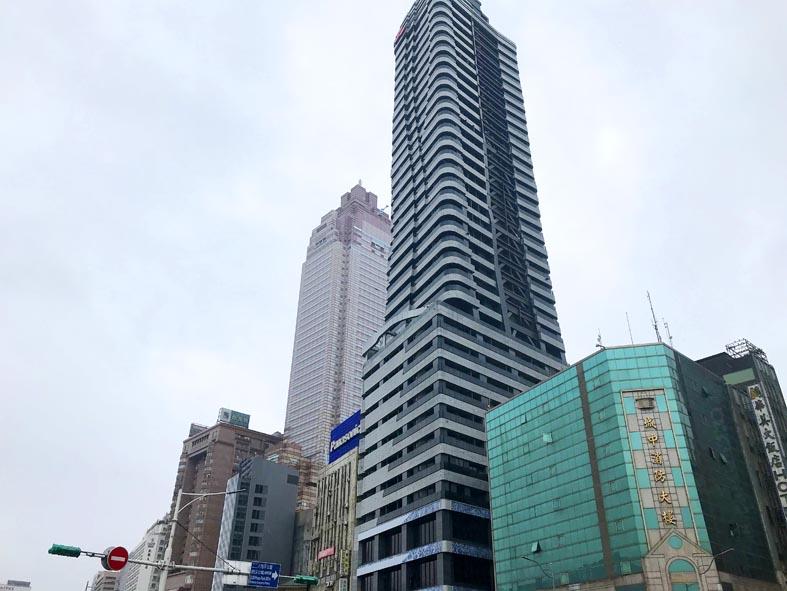Kee Tai Properties Co (基泰建設) is in October to auction off its mixed-use complex near Taipei Railway Station for what many believe would be the biggest deal this year.
The Taipei-based developer reiterated its plan to auction the property at its annual general meeting yesterday, where shareholders approved the distribution of a NT$0.5 cash dividend per share, although the company incurred losses last year.
The complex on Zhongxiao W Road, directly across from the proposed Taipei Twin Towers (台北雙子星) development project, has 37 floors above ground and six basement floors, the company said on its Web site a day earlier.

Photo: Hsu Yi-ping, Taipei Times
Built in 2019, the complex has occupants on 16 floors. Kee Tai refused to disclose its asking price, except to say it does have a base price in mind and the bidder with the highest offer above that figure would win.
The company has set aside the fourth to 35th floors as hotel spaces and previously partnered with InterContinental Hotels Group to take advantage of its convenient location.
The property has a floor area of 7,224.08 ping (23,881m2) and a land area of 448.305 ping, company data showed.
Kee Tai told shareholders that it intends to introduce three new projects per year, a conservative pace because it has focused on land in Taipei’s central districts where supply is scarce.
The company said it has sold out all apartment units at a new housing project in the city’s Shilin District (士林), but sales of another project with superfices rights in the affluent Daan District (大安) have taken a hit from the COVID-19 outbreak.
Kee Tai said it is willing to sell or lease unsold houses from previous projects in Taipei to take a profit.
The complex near Taipei Railway Station could generate NT$12 billion to US$15 billion (US$429.41 million to US$536.77 million) in revenue, real-estate brokers said.
Colliers International Taiwan (高力國際) voiced concern that buyers might have difficulty achieving a 2 percent annual return if it sold for NT$12 billion to NT$13 billion, given monthly market rents of NT$2,600 to NT$2,800 per ping in the area.
Honda Real Estate Group (宏大資產) is more optimistic, saying that the building could secure a 2.5 percent yield in rental income if it sets monthly rent at NT$3,000 per ping.
That would suggest a price tag of NT$15 billion for the complex, Honda said.
Kee Tai could consider lowering the purchase hurdles by selling the building in parts, as hotel spaces have had difficulty attracting private equity funds and life insurance companies, Honda said.

To many, Tatu City on the outskirts of Nairobi looks like a success. The first city entirely built by a private company to be operational in east Africa, with about 25,000 people living and working there, it accounts for about two-thirds of all foreign investment in Kenya. Its low-tax status has attracted more than 100 businesses including Heineken, coffee brand Dormans, and the biggest call-center and cold-chain transport firms in the region. However, to some local politicians, Tatu City has looked more like a target for extortion. A parade of governors have demanded land worth millions of dollars in exchange

An Indonesian animated movie is smashing regional box office records and could be set for wider success as it prepares to open beyond the Southeast Asian archipelago’s silver screens. Jumbo — a film based on the adventures of main character, Don, a large orphaned Indonesian boy facing bullying at school — last month became the highest-grossing Southeast Asian animated film, raking in more than US$8 million. Released at the end of March to coincide with the Eid holidays after the Islamic fasting month of Ramadan, the movie has hit 8 million ticket sales, the third-highest in Indonesian cinema history, Film

Taiwan Semiconductor Manufacturing Co’s (TSMC, 台積電) revenue jumped 48 percent last month, underscoring how electronics firms scrambled to acquire essential components before global tariffs took effect. The main chipmaker for Apple Inc and Nvidia Corp reported monthly sales of NT$349.6 billion (US$11.6 billion). That compares with the average analysts’ estimate for a 38 percent rise in second-quarter revenue. US President Donald Trump’s trade war is prompting economists to retool GDP forecasts worldwide, casting doubt over the outlook for everything from iPhone demand to computing and datacenter construction. However, TSMC — a barometer for global tech spending given its central role in the

Alchip Technologies Ltd (世芯), an application-specific integrated circuit (ASIC) designer specializing in server chips, expects revenue to decline this year due to sagging demand for 5-nanometer artificial intelligence (AI) chips from a North America-based major customer, a company executive said yesterday. That would be the first contraction in revenue for Alchip as it has been enjoying strong revenue growth over the past few years, benefiting from cloud-service providers’ moves to reduce dependence on Nvidia Corp’s expensive AI chips by building their own AI accelerator by outsourcing chip design. The 5-nanometer chip was supposed to be a new growth engine as the lifecycle